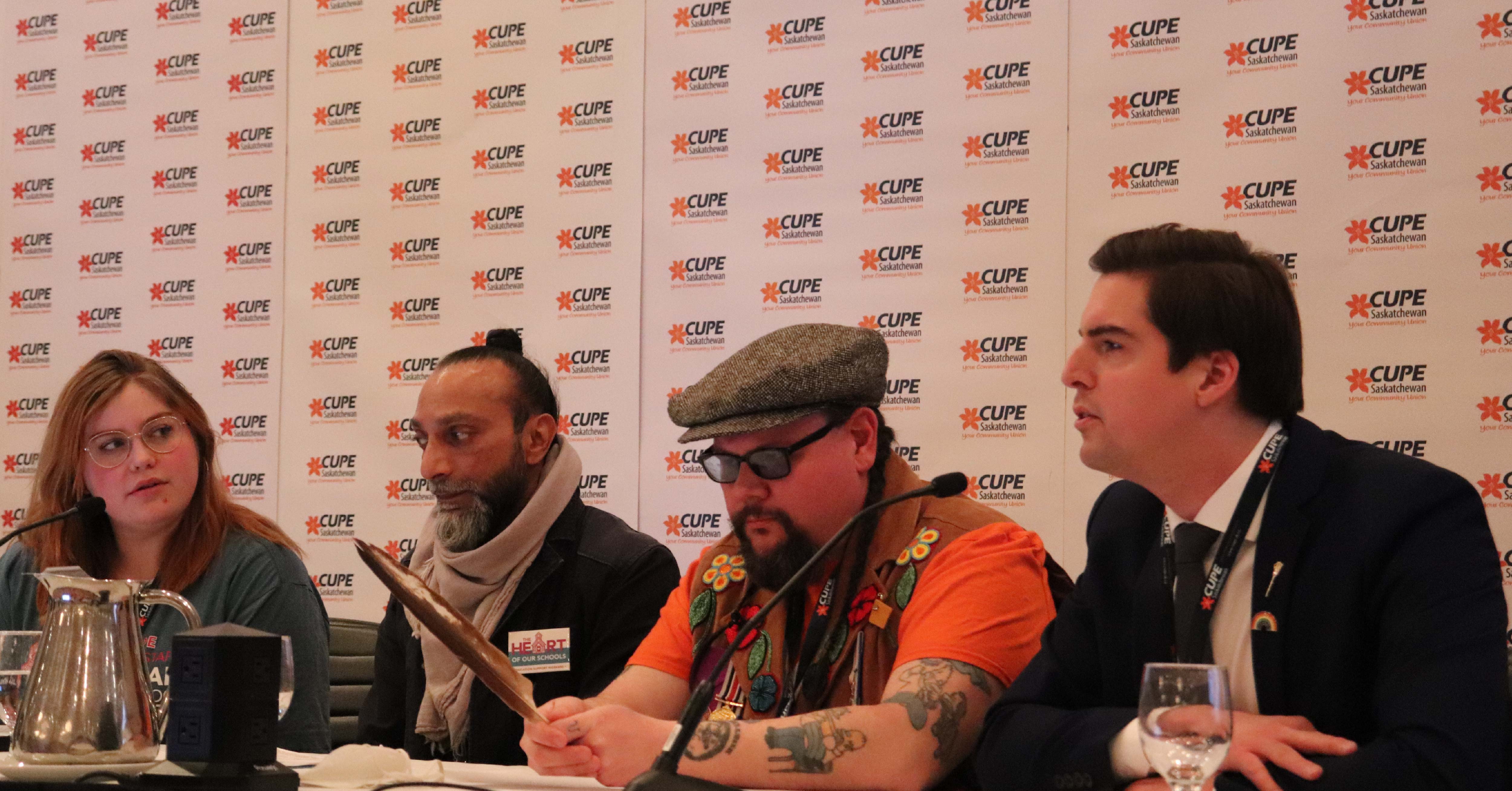 The CUPE Saskatchewan convention featured a panel discussion on recognizing and addressing the structural barriers that many Indigenous, racialized and 2SLGBTQI+ members in our union face, and to ensure our union is reflective of our members experiences.
The CUPE Saskatchewan convention featured a panel discussion on recognizing and addressing the structural barriers that many Indigenous, racialized and 2SLGBTQI+ members in our union face, and to ensure our union is reflective of our members experiences.
Emily Hitchings, an education support worker with CUPE 2268, is a member of the CUPE SFL Young Workers’ Committee, the CUPE Saskatchewan Young Workers’ Committee, and the CUPE National Young Workers’ Committee. Hitchings spoke passionately about combating ageism and engaging young workers.
“Young workers are more likely to have precarious jobs, student debt and face income poverty – and face ageism,” said Hitchings. “I didn’t really know about ageism until I experienced it. I had never been told that I couldn’t do anything until people started telling me I was too young to take on things. Ask young workers to get involved, ask them what the barriers are. The best people to tell you about the issues facing young workers are your diverse members.”
Aubrey Gonsalves was elected National Diversity Vice-President representing Black and racialized workers at the 2021 CUPE National convention, and is the president of CUPE 2316, representing workers at the Children’s Aid Society of Toronto.
Aubrey said that the two most important parts of overcoming barriers is mindset and strategy. “We need to recognize that barriers exist. But barriers are only obstacles that can be climbed over. You are not alone. There are others feeling the same way and wanting the same change.”
“When you ask what the barriers are, you can help build strategies to overcome them. Build allies because you will achieve more in a group than alone. Look for common goals. We can spend weeks talking about our differences, but we need to look at our common goals.”
John Brady McDonald, a member of CUPE 4195 is a Nehiyawak-Mėtis writer, artist, historian, musician, playwright, actor, and activist born and raised in Prince Albert. He is from the Muskeg Lake Cree Nation and the Mistawasis Nehiyawak. He is the author of several books, and his written works have been published and presented around the globe.
“I share my language today because I am a residential school survivor. They tried to take my language, but I am taking it back,” said McDonald. “They say time heals all wounds but we as Indigenous people haven’t had the time. The last residential school closed in 1998. I am worried that my children and my grandchildren are going to face the same barriers that I have. The difference now is we have allies. For a long time, we struggled alone, but as more and more people step up to the fight there will be more people who are willing to stand up and be counted.”
The final panelist was Nathaniel Teed, a member of CUPE 59, and the first openly gay MLA in Saskatchewan’s history. Teed was elected as the NDP MLA for Saskatoon Meewasin in 2022.
Teed has a long history of involvement as a CUPE member. While attending school to attain a Bachelor of Education, he worked as an education assistant.
“I looked around the education system and saw how few Queer and Trans people were teachers. Thousands of children are going through the education system who are never seeing people who look like them. It is important that children and students see themselves in their life – in their schools, on their television and in their politics,” said Teed.
Teed decided to run for the nomination during the 2022 byelection in Saskatoon Meewasin.
“Saskatchewan had never elected an openly gay person to the legislature. I wanted to show up and shatter that rainbow ceiling,” added Teed. “We need to continue to make changes to ensure that the legislature reflects the diversity of all people in this province. And every time we have a breakthrough, we hopefully make it a bit easier for the next person. My advice to you is to support the diverse people in your organization.”
/cope491 /cope342
